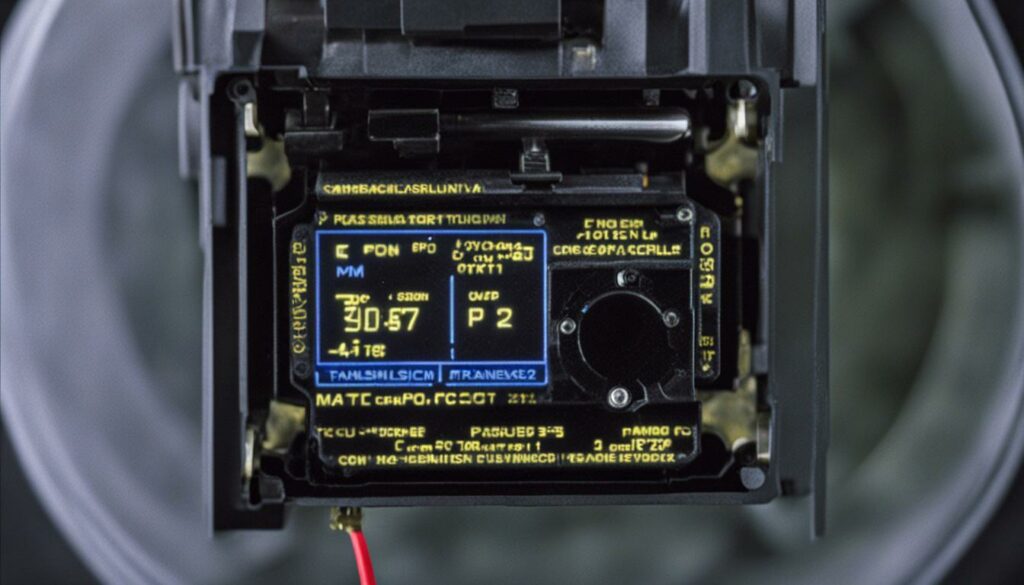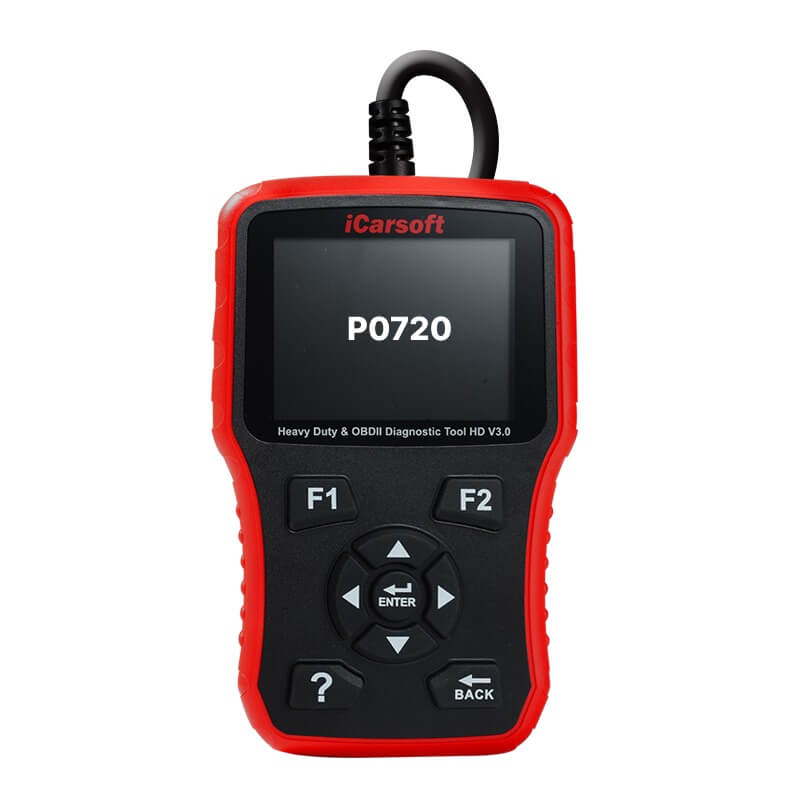P0720 – TCM Internal Failure: Diagnosing and Repairing Transmission Control Module Issues
POSTED IN pcodes
Welcome to our comprehensive guide on P0720 – TCM Internal Failure. If you’re experiencing transmission issues or have come across this error code, it’s important to understand its implications and take the necessary steps to diagnose and repair the problem. In this article, we’ll delve into the symptoms, causes, troubleshooting procedures, and repair methods associated with P0720 – TCM Internal Failure. Whether you’re a seasoned mechanic or a car owner looking to understand the issue better, we’ve got you covered. Let’s get started!
Key Takeaways:
- P0720 – TCM Internal Failure is a diagnostic trouble code that indicates a failure in the vehicle speed sensor or speed sensor circuit.
- Common symptoms include inaccurate speedometer readings, check engine light, delayed shifting, and transmission issues.
- Possible causes include a dead speed sensor, wiring circuit damage, faulty PCM, or transmission fluid temperature sensor failure.
- Troubleshooting involves scanning the vehicle with an OBD II reader, testing various components, and following recommended diagnostic procedures.
- Repair methods may include replacing the speed sensor, addressing wiring circuit damage, or fixing issues with the PCM.
Symptoms of P0720 – TCM Internal Failure
Experiencing issues with your vehicle’s transmission can be a daunting and frustrating experience. One common problem that drivers may encounter is the P0720 error code, indicating a TCM Internal Failure. Recognizing the symptoms associated with this code is crucial in diagnosing and addressing the underlying issue.
The symptoms of P0720 – TCM Internal Failure can vary depending on the specific vehicle and its transmission system. However, there are several common indicators to be aware of:
- Check engine light: The illumination of the check engine light is a significant indication that something is amiss with your vehicle’s transmission. When the TCM fails internally, it can trigger the check engine light to turn on.
- Inaccurate speedometer reading: A malfunctioning TCM can cause the speedometer to provide inaccurate readings or fluctuate unexpectedly. You may notice that the speedometer needle does not correspond with your actual speed or that it jumps around sporadically.
- Cruise control disengagement: A failing TCM can interfere with the operation of the cruise control system. If you find that your cruise control disengages unexpectedly or fails to maintain a consistent speed, it could be a symptom of TCM Internal Failure.
- Clutch slipping: TCM issues can also manifest as clutch slipping. This is characterized by a loss of power when accelerating or a noticeable decrease in vehicle performance. If you feel like your vehicle is struggling to maintain power despite pressing the accelerator, it is essential to investigate possible TCM-related causes.
- Delayed and rough shifting: A malfunctioning TCM may result in delayed or rough shifting between gears. You may experience a delay in gear engagement when shifting or notice a jerking motion during gear changes. These symptoms can significantly affect the drivability and smoothness of your vehicle.
- Gear limitations: Another symptom of TCM Internal Failure is when the transmission gets stuck in a specific gear. Your vehicle may refuse to shift into higher or lower gears, limiting its overall performance and potentially causing further damage to the transmission system.
- Transmission issues: TCM problems can also lead to more severe transmission issues, such as slipping gears, overheating, or complete transmission failure. If you notice any of the symptoms mentioned above along with other signs of transmission trouble, it is crucial to address the problem promptly to prevent further damage.
Recognizing these symptoms early on and taking the necessary steps to diagnose and fix the issue can help prevent more significant transmission problems down the line. If you experience any of the symptoms associated with P0720 – TCM Internal Failure, it is recommended to seek professional assistance or consult your vehicle’s service manual for further guidance.

Buy tested tuning file for Adblue / EGR / DPF / Adblue off now!
Causes of P0720 – TCM Internal Failure
When encountering the P0720 – TCM Internal Failure code, it is essential to investigate the underlying causes to effectively address the issue. Understanding the root cause can lead to proper diagnostics and appropriate remedial measures. In this section, we will explore the common causes of the P0720 error code.
Dead Speed Sensor
One of the most prevalent culprits behind the P0720 code is a dead or faulty speed sensor. The speed sensor plays a critical role in measuring the speed of the transmission and relaying this information to various vehicle systems. A malfunctioning or non-operational speed sensor can trigger the TCM Internal Failure code.
Wiring Circuit Damage
Damage to the wiring circuit can also lead to the P0720 error code. Corrosion, frayed wires, or loose connections can disrupt the transmission of signals between the speed sensor and the TCM. This disruption can result in the TCM Internal Failure code being triggered.
Faulty PCM
The Powertrain Control Module (PCM) is responsible for managing the vehicle’s engine and transmission functions. If the PCM malfunctions or fails, it can interfere with the proper operation of the speed sensor, causing the P0720 code to appear.
Transmission Fluid Temperature Sensor Failure
Another potential cause of the P0720 error code is the failure of the transmission fluid temperature sensor. This sensor measures the temperature of the transmission fluid and provides crucial data to the TCM. If the sensor fails or provides inaccurate readings, it can trigger the TCM Internal Failure code.
Identifying and addressing these causes is crucial for resolving the P0720 – TCM Internal Failure code. Below is a summarized table detailing the potential causes of the P0720 code along with their corresponding solutions.
| Causes | Solutions |
|---|---|
| Dead Speed Sensor | Replace the faulty speed sensor with a new one. |
| Wiring Circuit Damage | Inspect and repair any damaged wiring circuits or connections. |
| Faulty PCM | Replace the faulty PCM with a functioning one. |
| Transmission Fluid Temperature Sensor Failure | Replace the faulty transmission fluid temperature sensor. |
By addressing the root cause of the P0720 – TCM Internal Failure code, you can effectively resolve the issue and ensure the proper functioning of your vehicle’s transmission system.
Troubleshooting P0720 – TCM Internal Failure
Troubleshooting the P0720 – TCM Internal Failure code requires a step-by-step approach to accurately identify the underlying issues. By following the recommended diagnostic procedures, you can effectively diagnose and resolve the problem. Here is a breakdown of the troubleshooting process:
1. Scanning the Vehicle
Start by scanning the vehicle using an OBD II reader to retrieve the P0720 fault code. This will provide valuable information about the specific area of concern.
2. Testing the Speed Sensor
The speed sensor is a critical component in detecting the vehicle’s speed and relaying it to the transmission control module (TCM). Testing the speed sensor involves using a multimeter to check for proper voltage and continuity. Consult the vehicle’s service manual for the appropriate testing specifications.
3. Inspecting the Wiring Harness
A damaged or faulty wiring harness can disrupt the signal transmission between the speed sensor and the TCM. Inspect the wiring harness carefully for any signs of wear, damage, or loose connections. Repair or replace any damaged wiring as necessary.
4. Checking the Transmission Fluid Temperature Sensor
The transmission fluid temperature sensor measures the temperature of the transmission fluid and provides crucial data to the TCM. A failed sensor can trigger the P0720 code. Use a multimeter to test the sensor’s resistance and ensure it falls within the acceptable range defined by the manufacturer.
5. Evaluating Additional Components
If the above steps do not resolve the issue, it may be necessary to inspect and test other related components, such as the powertrain control module (PCM) and the vehicle speed sensor circuitry. Consult the vehicle’s service manual for specific diagnostic procedures.
Note:
Professional assistance may be required to access and interpret diagnostic information accurately. It’s essential to follow the recommended diagnostic procedures and consult a qualified technician or service center if needed.
By methodically following the TCM diagnostic procedure outlined above, you can effectively troubleshoot the P0720 – TCM Internal Failure code. Identifying and resolving the root cause of the issue will help restore optimal performance to the transmission system.
Image:

Repairing P0720 – TCM Internal Failure
Resolving the P0720 – TCM Internal Failure code requires a systematic approach to identify and address the underlying issues. Here are the key steps involved in repairing this error:
1. Diagnostic Scanning:
Begin by connecting an OBD II reader to retrieve the fault code. The scanner will provide valuable information about the P0720 code, aiding in the diagnosis process.
2. Speed Sensor Inspection:
Inspect the speed sensor and its wiring for any signs of damage or malfunction. A faulty speed sensor is a common cause of the P0720 code. If necessary, replace the speed sensor with a genuine or compatible part.
3. Wiring Circuit Repair:
Check the wiring circuit associated with the speed sensor for any breaks, fraying, or loose connections. Repair or replace the damaged wiring as needed to restore proper functionality.
4. PCM Examination:
Inspect the Powertrain Control Module (PCM) for any faults or malfunctions. If the PCM is found to be faulty, it may need to be repaired or replaced by a qualified professional.
5. Component Installation:
When replacing any components, such as the speed sensor or PCM, ensure proper installation according to the manufacturer guidelines. The use of genuine, OEM, or compatible parts is crucial to maintain the integrity of the vehicle systems.
Following these repair procedures and conducting thorough testing and verification will help resolve the P0720 – TCM Internal Failure code. If you are not confident in your repair skills, it is recommended to seek professional assistance for accurate diagnosis and reliable repairs.
By addressing the root causes and using appropriate repair methods, you can effectively resolve the P0720 code and ensure the smooth operation of your vehicle’s transmission.
Conclusion
In conclusion, the P0720 – TCM Internal Failure code is an indication of a problem with the vehicle’s speed sensor or speed sensor circuit. If you encounter this code, it is important to address the issue promptly to prevent further damage to the transmission and related systems.
Professional assistance is recommended for accurate diagnostics and repairs. A skilled technician will be able to identify the root cause of the problem and perform the necessary repairs or replacements. It is crucial to use quality parts that are compatible with your vehicle to ensure a successful resolution of the code.
However, if professional assistance is unavailable or you prefer an alternative approach, there is an option to permanently remove the P0720 code by uploading the Engine Control Unit (ECU) file to a portal. Keep in mind that this solution may not address the underlying issue, and it is always advisable to consult with a professional for a comprehensive diagnosis and repair.
To prevent the occurrence of the P0720 – TCM Internal Failure code in the future, it is important to follow the recommended repair procedures and perform regular maintenance on your vehicle’s transmission system. By taking proactive measures and addressing any potential issues early on, you can ensure the smooth operation of your vehicle and avoid costly repairs down the line.
FAQ
What does the P0720 code mean?
The P0720 code indicates a failure in the vehicle speed sensor or speed sensor circuit. It is a diagnostic trouble code that can trigger symptoms such as inaccurate speedometer readings, delayed shifting, and transmission issues.
What are the symptoms of P0720 – TCM Internal Failure?
Some common symptoms include a check engine light, inaccurate speedometer reading, cruise control disengagement, clutch slipping, delayed and rough shifting, gear limitations, and transmission issues.
What are the causes of P0720 – TCM Internal Failure?
The main cause is a dead speed sensor. However, other potential causes include wiring circuit damage, faulty PCM, and transmission fluid temperature sensor failure.
How do I troubleshoot P0720 – TCM Internal Failure?
Start by scanning the vehicle with an OBD II reader to retrieve the fault code. Further diagnostics may involve testing the speed sensor, wiring harness, and transmission fluid temperature sensor using a multimeter. Consult the vehicle’s service manual for recommended diagnostic procedures.
How do I repair P0720 – TCM Internal Failure?
Repairing may involve replacing a faulty speed sensor, repairing wiring circuit damage, or addressing issues with the PCM. Use genuine, OEM, or aftermarket parts and follow the recommended repair procedures for a successful resolution.


